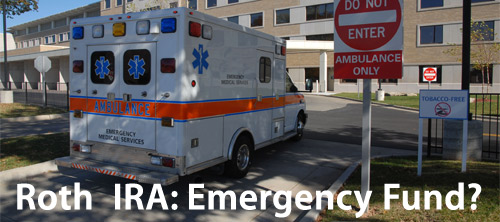I recently found out that one of my associates uses her Roth IRA as an emergency fund. Rather than put money into a low yield savings account, or some other cash account, she uses her retirement account as an emergency fund. Technically, the basics of a Roth IRA are conducive to this arrangement. However, you do want to be careful. Think things through before you use your Roth IRA as an emergency fund.
Quick Navigation
Why Your Roth IRA Could, In Theory, Be An Emergency Fund
In theory, your Roth IRA works as an emergency fund because of the withdrawal rules. You are actually allowed to withdraw your contributions to a Roth IRA at any time, and for any purpose – no matter your age. This means that you can take money out of your Roth IRA with no penalty or tax, as long as you are only withdrawing money that you have sent to the account through regular annual contributions. As long as your withdrawal amount doesn't exceed your overall contribution amount, you don't have to pay a penalty or taxes. Keep in mind that previous withdrawals count against your overall contribution amount.

You do have to be careful, though. Withdrawing from your Roth IRA can cost you if you don't do it right. If you are under 59 1/2, and you exceed your contribution amounts (except in certain cases), you might be subject to a 10% penalty and to paying income taxes on the amount. Make sure you know what you are doing before you withdraw money from your Roth IRA to shore up your finances in the case of emergency.
Opportunity Cost
While you might not have the expenses associated with penalties and taxes when you withdraw your contributions to your Roth IRA, you are still subject to opportunity cost. Remember: The money in your Roth IRA is working for you. You are earning interest at a pretty good rate (depending on your asset allocation and market conditions), and if you withdraw principal, you miss out. You can't replace the time that your money might have spent in your Roth IRA, growing with the power of compound interest.
On the other hand, though, some insist that the opportunity cost comes when you put that money in a low yielding cash account as an emergency fund. Because your money (theoretically) grows faster in the Roth IRA, the power of compounding interest at a higher rate makes up for the fact that you withdraw some of your contributions for emergencies.
Bottom Line
What you decide to do depends on what you think is likely to work best for you, and provide for your needs. If you plan ahead sufficiently, it should be possible to get quite a bit built up in your Roth IRA. Of course, for it to work, you need to make sure you only withdraw contributions in cases of true emergencies. If you use your Roth IRA as an ATM, you could easily remove all of your contributions quickly — and then move into penalty areas where it starts costing you more. Make sure you carefully evaluate your situation before adopting this emergency fund strategy.
I am opposed to using the Roth IRA as an emergency fund. You may be dipping into it for multiple times a year. It is not what is supposed to be used for. Itis for longer range savings such as a first home or retirement.
I’m with Krantcents, I’d think twice about using the Roth IRA because you can short circuit gains in the account by constantly withdrawing funds for both real and imagined “emergencies”.
Instead I’d set up a separate emergency fund that can be used while leaving your Roth IRA untouched.
It is nice to know that this is an option in an pinch though..
I think that it’s good to have an emergency fund outside of your IRA. However, if worse comes to worse and that’s all you have then I think you’ve made some good recommendations.
I have thought about this, but ultimately decided against it for a couple of reasons. If you do need to pull out your contributions for an emergency, that’s fine and dandy. But, once you recover from your emergency and want to put money back into your emergency fund, you are limited to how much you can contribute each year. I like the idea of investing it and leaving it alone.
It’s always best to have an actual emergency fund for the stated purpose. But for people in their 20s and 30s the idea has merit. It’s important to get a jump on retirement planning early, but when you’re that young there’s a whole lot of life between here and 65. That will translate to a lot of emergencies, especially when kids come along.
Again, best to have a separate emergency fund, but because of that unique ability to earn income tax free AND withdraw contributions without tax consequences makes the Roth an excellent Plan B for emergencies.